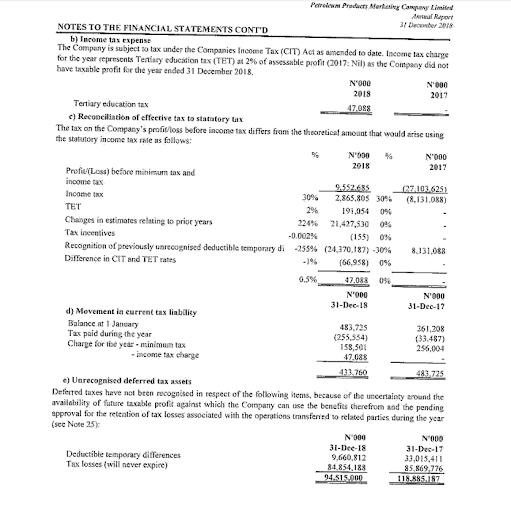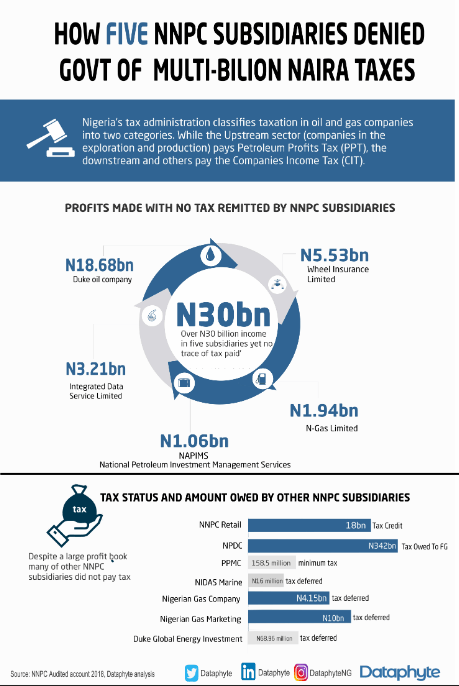In 2018, over ₦30 billion in five subsidiaries’ earnings went untaxed;
Apart from the 5 subsidiaries, NPDC and PPMC owe FG ₦342 billion and ₦94 billion in tax debts;
Experts call for a proper tax framework for government agencies.
Five subsidiaries of the Nigerian National Petroleum Corporation (NNPC) have denied the Federal Government (FG) multi-billion naira in taxes, according to Dataphyte’s analysis. The analysis of the financial statements showed that Integrated Data Services Limited, Duke Oil Company Inc, Wheel Insurance Limited, N-Gas Limited, and National Petroleum Investment Management Services (NAPIMS) failed to make tax payments to the government.
For instance, despite making a pre-tax profit of ₦18.68 billion ($61.03 million) in 2018, Duke Oil Company Inc (Duke Panama) paid no taxes anywhere.
Other subsidiaries with no record of tax in 2019 include Integrated Data Services Limited with ₦3.21 billion pre-tax profit, Wheel Insurance Limited, N-Gas Limited, and NAPIMS with $18.1 million (₦5.53 billion), $6.38 million (₦1.94 billion), and ₦1.06 billion profits, respectively.
This means that the subsidiaries’ earnings valued at ₦30.42 billion went untaxed in 2018. This denial and inappropriateness of NNPC subsidiaries lead to a significant reduction in revenue payable to the Federal Government.
s/n | NNPC Subsidiaries | Tax | Income |
1 | Integrated Data Services Limited | Nil | ₦3.21 billion |
2 | Duke Oil Company Inc | Nil | $61.03 million (₦18.68 billion) |
3 | Wheel Insurance Limited | Nil | $18.1 million (₦5.53 billion) |
4 | N-Gas Limited | Nil | $6.38 million (₦1.94 billion) |
5 | National Petroleum Investment Management Services (NAPIMS) | Nil | ₦1.06 billion |
| Total | | ₦30.42 billion |
Source: NNPC 2018 Financial Statements / Dataphyte analysis
Other Irregularities on Tax Compliance by Subsidiaries
A look at the other subsidiaries showed that some of them paid less tax despite a large profit book.
NPDC’s tax debt
Further breakdown showed that at the end of 2018, the Nigerian Petroleum Development Company – NPDC owed the government ₦342bn in taxes.
PPMC Low Tax Payment, Owe FG N94 billion in Taxes
Pipelines and Product Marketing Company (PPMC) paid little tax (minimum tax) at ₦255 million for the period. The company said it did not make a taxable profit for the period, an approach allowed by the Companies Income Tax Act.

NNPC Subsidiaries 2018 financial statement
The subsidiary also carried forward ₦94 billion in “tax losses” from prior years. The amount was an overdue tax payment owed to the Federal Government.
Tax credit to NNPC Retail Ltd
For 2018, the retail arm of the NNPC paid no tax for the year. It got a ₦1. 18bn “tax credit,” despite making ₦236.6 billion in revenue Pre-tax profit. In 2017, it also got ₦1.29 billion as a tax credit.
Another alarming irregularity in the NNPC Retail account is that almost all profits consumed by ₦212.4 billion cost of sales and ₦16.325 billion in administrative expenses.
S/N | Subsidiaries | Tax | Profit |
1 | Duke Global Energy Investment Ltd | ₦68.96 million (Deferred Tax) | ₦41.67 million |
2 | NNPC Retail | ₦1.18 billion (Tax credit) | ₦2.28 billion |
3 | NPDC | ₦80.7 billion (Deferred tax) | ₦179.14 billion |
4 | Petroleum Product Marketing Company (PPMC) | ₦47.09 million (Income tax expense) ₦158.5 million (Minimum Tax) | ₦11.12 billion |
5 | Nigerian Gas Company Limited | ₦4.15 billion (Deferred Tax) | ₦16.62 billion |
6 | Nigerian Gas Marketing Limited | ₦10 billion (Deferred tax) | ₦19.99 billion |
7 | NIDAS Marine Limited | ₦16 million (Deferred tax) | ₦761 million |
Source: NNPC 2018 Financial Statements/Dataphyte analysis
Nigeria’s Tax Administration in Oil and Gas Sector
Nigeria’s tax administration classifies taxation in oil and gas companies into two categories. While the Upstream sector (companies in the exploration and production) pays Petroleum Profits Tax (PPT), the downstream and others pay the Companies Income Tax (CIT).
So for Joint Venture and sole risk production companies, within the first five years, the government expects a rate of 65.75 per cent on. The rate is 85 per cent from companies in operation for over five years, according to the Petroleum Profits Tax Act Cap P13 LFN 2004 (as amended). For the companies under the Production Sharing Contract, it is 50% of the chargeable profit.
The Integrated Data Services Limited (IDSL), Nigerian Petroleum Development Company (NPDC), and National Petroleum Investment Management Services (NAPIMS) are examples of companies in the upstream sector.
The downstream sector set aside 30 per cent of total profits for deductions as Companies Income Tax. The Finance Act 2020 also introduced some changes to the Companies Income Tax, but mostly on the digital economy and distribution of dividends to shareholders.

NNPC, FIRS Decline To Comment
To get a clearer picture of how the Federal Inland Revenue Service (FIRS) enforced tax compliance, Dataphyte reached out to the Spokesperson of the Service, Mr Abdullah Ismaila Ahmed.
When asked why some subsidiaries failed to pay taxes despite making profits, he requested for the names of the subsidiaries. “You need to send the names of the subsidiaries to my WhatsApp account so I can check the office and give you feedback,” he said.
Days after sending the names, Mr Ahmed refused to comment or reply to chats and text messages to his phone.
The spokesperson of the NNPC, Dr Kennie Obateru, also failed to make a comment on the non-payment of tax by the subsidiaries. At first phone conversation, he requested the reporter to call or drop a message. After dropping a message about the enquiries, Dr Obateru has since not responded to any correspondence.
Low Tax Compliance: Experts Call For Proper Tax Framework For Government Agencies
Despite believing the Petroleum Industry Bill (PIB) will change the landscape in the oil and gas sector, stakeholders called for full compliance to various tax policies in the country.
Mrs Ronke Onadeko, an oil and gas consultant, said the passage of the PIB should address many of the challenges, giving us “varying degrees of success.”
As for Mr Taiwo Oyedele, West African Tax Leader at PwC, speculation was ill-advised as tax provisions are an accounting issue, while tax payments were a matter of the law.
“However, where tax provisions or tax payments are due based on the relevant accounting standards and tax laws, there should be full compliance by all affected entities, whether private or government-owned.”
Mr Oyedele also alluded to the fact that MDAs’ adherence to tax payments is low.
“Unfortunately, the level of tax compliance by MDAs is low, and this needs to change. Non-compliance goes beyond tax provisions in the financial statements to include other taxes such as VAT, PAYE.”
Mr Atiku Samuel, a policy analyst, describes the situation of non-compliance to tax payments by the government agencies as a systemic problem. He said the Federal Inland Revenue Service (FIRS) needs overhauling and a control system.
“First, the Auditor-General report of 2017 revealed how over 200 agencies of government failed to submit their statements, and nothing has happened to anyone since then…”
According to Atiku, the FIRS was also setting a terrible precedent in refusing to pay tax or open its accounting book; making it difficult for the organisation to demand accountability from other government agencies. More so, “there is no clear cut defined framework for taxing government entities. We need to take a quick look at that. It is a question of transparency.”
And while the planned Petroleum Industry Bill (PIB) should, in theory, address some of these challenges, “we need more than the Bill to make the oil and gas sector a sane environment.”
Mr Atiku also highlighted the need for special courts that will solely deal with transparency and accountability issues in government; this would address financial misconduct.
From the preceding, it is clear there is a need for mechanisms that ensure NNPC and its subsidiaries remit revenue to the FG account. As a result, Nigeria may yet fund its budget, reduce local and foreign borrowings, and facilitate developmental programmes.
The Auditor-General has also described non-remittance of revenue by government agencies as a factor responsible for Nigeria’s debt burden. Through its audit reports, the office of the Auditor-General had recommended appropriate sanctions to defaulting agencies and a workable template for the NNPC and its subsidiaries.
NNPC Joins EITI As A Partner Company To Deepen Transparency
On Tuesday, August 18, 2020, the NNPC said it has joined the Extractive Industries Transparency Initiative (EITI) as a partner company to deepen accountability.
In a statement issued by Dr Kennie Obateru, the spokesperson of the Corporation, the new status would require NNPC to disclose taxes and payments. It would also ensure it publicly disclosed beneficial owners, engage in rigorous procurement processes, publicly declare support for the EITI Principles and, by promoting transparency throughout the extractive industries, among others.
“This is an enormous leap in actualising the desired ability and access to independent bodies to scrutinise indices, data and operations, and encourage best practice in the oil and gas sector.
“Accountability partners such as Nigeria EITI, Nigeria Natural Resource Charter (NNRC), and Natural Resource Governance Institute (NRG Institute) stand to move faster and do more with this new partnership,” Mrs Onadeko told Dataphyte.
The new partnership status would enable Nigeria to operate a transparent oil and sector and allow stakeholders to question activities and help investors to make better investment decisions in the sector.




